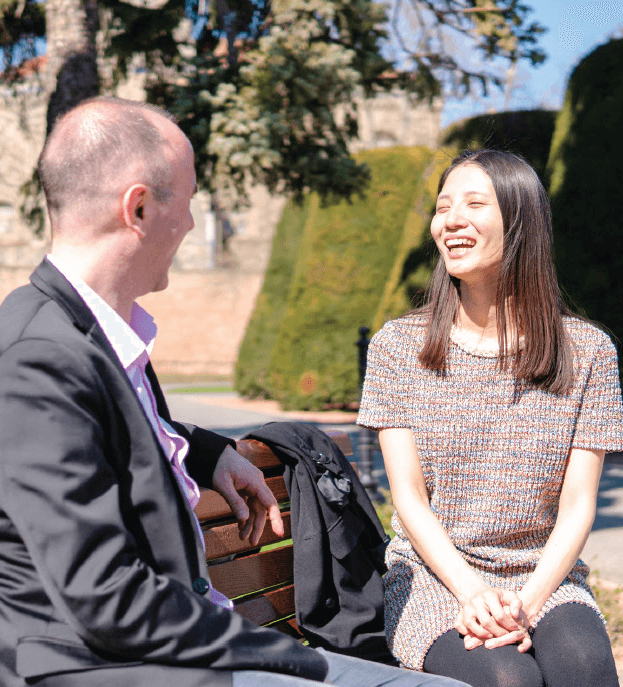We’re surrounded by stories. I took a trip recently and all I heard were stories: on the shuttle to the airport, while going through the security lines, at the gate, on the airplane, and while waiting for my baggage. Everyone was sharing stories. The flight attendants were no doubt telling stories to each other about us!
Many speakers lower their head and murmur that they don’t have great stories since they haven’t beaten cancer, founded a Fortune 500 company, or won a Nobel Prize. But everyone has stories; you just need to uncover them.
The Best Stories: Unique Yet Universal
What makes a speaker’s story compelling? For starters, it’s their story. Not a story gleaned from an article or book you read or lifted from another speaker’s repertoire. Audiences can sense when a story is fictitious or appropriated from other sources. Authenticity reigns.
For the audience to embrace your personal story, it needs a universal theme that people can relate to. Otherwise, your story is not serving your audience.
For example, we can all relate to stories with these familiar themes:
- Coming of age
- Acquiring wisdom
- The hero’s journey
- Finding Prince Charming
In fact, the list of universal truths is a lengthy one. For any story you’re considering using, identify the broad appeal it offers listeners.
History, Her Story, Our Story
Your family has stories—about your birth or how your ancestors arrived in this country. Your religion has stories. Your organization has them: about the founders, the incorporating of the business, and its development. Your nation has them: about its founders, wars, famines, transformations, and growth. Cultures have them; often they take the form of myths and legends. You have stories—of growing up, of life’s milestones, of your travels. It’s time to uncover them.
For the audience to embrace your personal story, it needs a universal theme that people can relate to.
What makes a story meaningful and memorable is how you tie it in to something larger that people recognize and understand. A successful story needs to do more than give an account of something that happened to you; rather, there needs to be a moral, learning point, or universal truth embedded within it that others can relate to. Keep that in mind as you begin to mine your past.
Uncovering Your Story Gems
People constantly ask me: “How do I find my own stories?” It’s hard to do in isolation yet easy to do with the help of others. Engage a friend, colleague, or family member and spend some time together. Have them ask you about the following situations and capture what emerges (through notes or a recording). Many of the questions pertain to the first time you did something. While this list is by no means exhaustive, it is guaranteed to generate stories.
 Favorite vacation
Favorite vacation- First day at school
- First pet
- Childhood best friend
- Your first girlfriend/boyfriend
- First breakup
- Favorite vacation
- First time you saw your partner
- First job
- First place you lived on your own
 Childhood best friend
Childhood best friendOther topics that spark stories:
- What was your family like?
- Where did you grow up and what made it distinctive?
- What were some of your favorites when you were a child? Foods? Friends? Music? Hangouts? Relatives?
- What has been the most exciting or unusual thing you’ve done?
- Have you ever witnessed an extraordinary event?
- Have you ever encountered a famous person? If so, what did you do or say?
 First pet
First petUsing this process, I generated stories about the large dog on the corner that inhibited my newspaper route, the time I made a famous comedian laugh, and a mishap at a Chinese banquet hall in Hong Kong. Once you’ve found a story to develop, expand on it with details and then weave in a takeaway or a common life theme so the audience goes away with something deeper than your personal story. Listeners will either inhabit your story with you, or it will remind them of their own story. Either way, you’ve connected!
Types of Stories for Everyone
Your use of story can be educational, entertaining, inspirational, motivational, or some combination thereof.
Professional speakers, trainers, consultants, and coaches use stories strategically to tie into the main theme or learning point they are discussing. Parents often use stories to teach children lessons and instill a sense of family, religious, national, and cultural heritage. Many professionals have a “signature” story, a story of their own as distinctive as their signature. They tell it flawlessly, again and again, as if for the first time.
 First job
First jobOthers, such as educators, storytellers, or aspiring World Champions of Public Speaking, use stories to transition from one part of a presentation to another. This technique creates a change of pace and redirects the audience’s attention to a third party.
“The human mind is wired to be receptive to stories,” says Dilip Abayasekara, DTM, a past International President and an Accredited Speaker. “A well-designed story helps the audience ‘feel’ the scene that the storyteller is painting … stories help people see, hear, and feel [your message]. If you want to connect with an audience, stories are an essential and invaluable tool.”
Stories validate and reinforce your message and offer an outlet for thoughtful reflection. Yours can too.
Story On!
 First time you met your spouse
First time you met your spouseOnce you have some stories to develop, start honing them. Don’t be afraid to experiment to find the right balance of story and message. How?
- Write them out—pay attention to the story arc: the beginning, the escalation, and the climax. Consider ending with a lesson you learned or a conclusion you reached.
- Tell them informally to your friends to see what interests them, what they want to hear more about, and what the stories mean to them.
- Share them at your Toastmasters club and in your other presentations.
- Check libraries or community centers or other gathering places for storytelling opportunities, anyplace where stories are freely exchanged. Ask for feedback before sharing your story and note reactions. (In the U.S., you can look for Story Swaps, which are often fostered by local story guilds or associations.)
- Record your stories. Then relax and listen to them critically and subjectively. How can you improve?
- Ask for feedback from your audiences—through written evaluations—to learn which stories stuck, which missed the mark, and which were their favorites. Try to find out specifically the why behind what worked and what didn’t.
- Practice, practice, practice.
- Listen to storytelling programs online or in podcast form, particularly “This American Life”, or “UnFictional”, or “Serial”.
- Listen to the stories told on The Moth and the rich oral histories recorded in StoryCorps.
 First apartment
First apartmentEveryone has stories. And we all should work on sharing those stories, not only to become better speakers, but to share ourselves with others. “Storytelling is something I have been trying to develop over the years, because I realize how powerful it is,” says Toastmasters’ 2019 World Champion of Public Speaking, Aaron Beverly. “Humans are built to tell stories; they are what keep people’s attention the most.”
So, dig in, discover your own story, and then you, too, will live happily ever after!
Craig Harrison, DTM, PDG a past District Director, is a professional speaker and coach who once buried his leads. He’s since MADE over his delivery style to lead with the benefits, outcomes, and solutions. Learn more at ExpressionsOfExcellence.com for more information.



 Previous
Previous
 Previous Article
Previous Article

